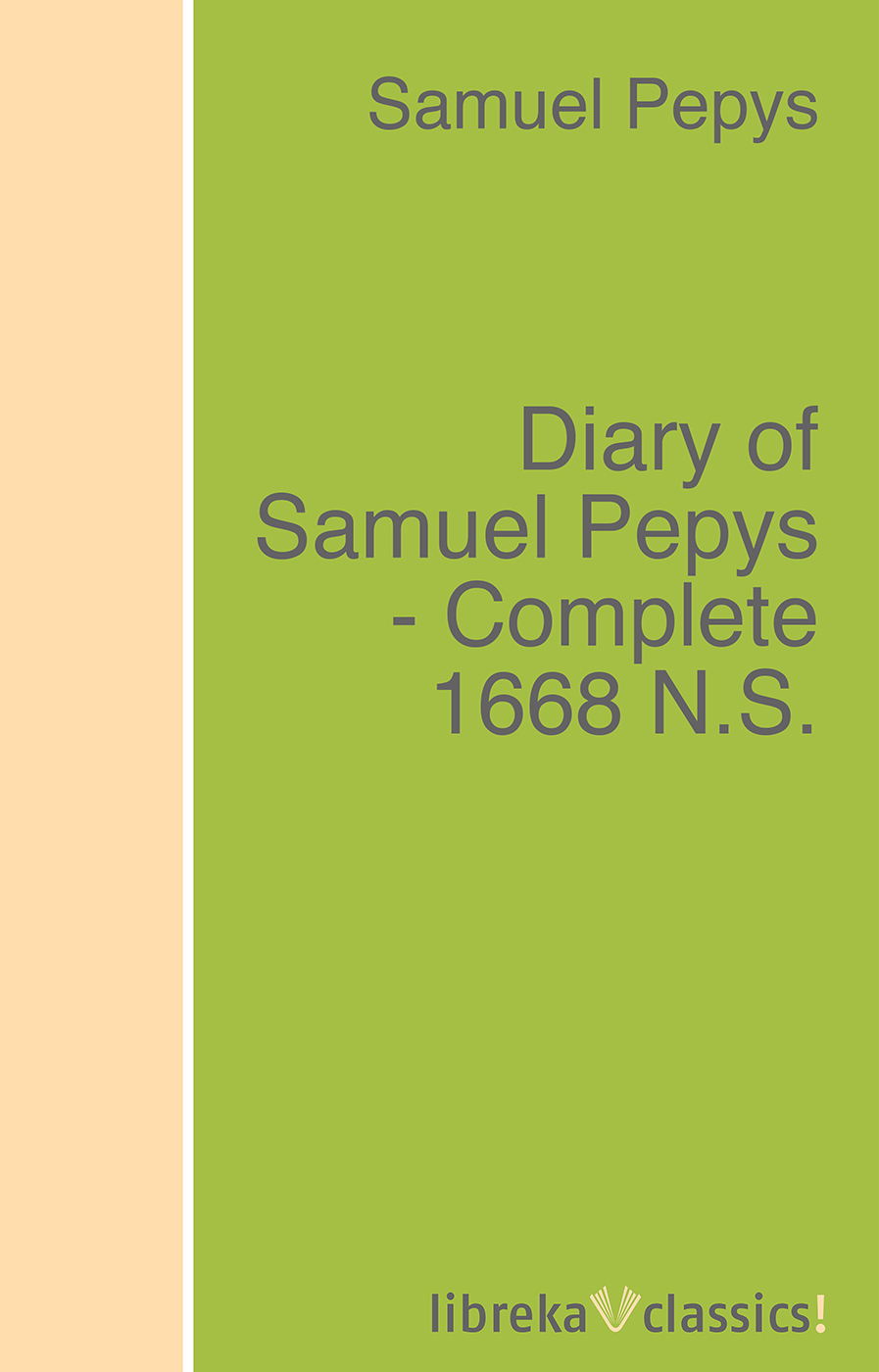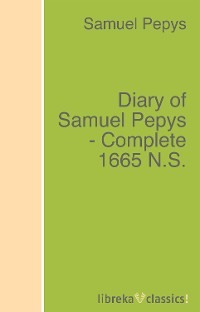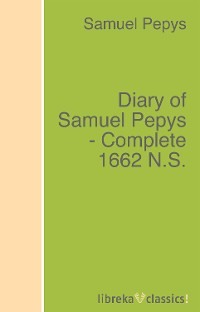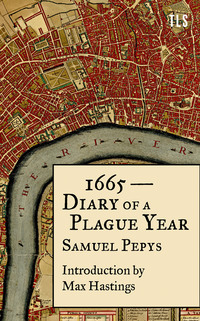
Полная версия
Diary of Samuel Pepys - Complete 1668 N.S.


Titel: Diary of Samuel Pepys — Complete 1668 N.S.
von Oliver Goldsmith, Samuel Pepys
ISBN 978-3-7429-4053-7
Alle Rechte vorbehalten.
Es ist ohne vorherige schriftliche Erlaubnis nicht gestattet, dieses Werk im Ganzen oder in Teilen zu vervielfältigen oder zu veröffentlichen.
THE DIARY OF SAMUEL PEPYS M.A. F.R.S.
CLERK OF THE ACTS AND SECRETARY TO THE ADMIRALTY
TRANSCRIBED FROM THE SHORTHAND MANUSCRIPT IN THE PEPYSIAN LIBRARY
MAGDALENE COLLEGE CAMBRIDGE BY THE REV. MYNORS BRIGHT M.A. LATE FELLOW
AND PRESIDENT OF THE COLLEGE
(Unabridged)
WITH LORD BRAYBROOKE'S NOTES
1668
By Samuel Pepys
Edited With Additions By
Henry B. Wheatley F.S.A.
LONDON
GEORGE BELL & SONS YORK ST. COVENT GARDEN
CAMBRIDGE DEIGHTON BELL & CO.
1893
COMPLETE
1667-1668 JANUARY 1667-1668 FEBRUARY 1667-1668 MARCH 1667-1668 APRIL 1668 MAY 1668 JUNE 1668 JULY 1668 AUGUST 1668 SEPTEMBER 1668 OCTOBER 1668 NOVEMBER 1668 DECEMBER 1668
JANUARY 1667-1668
January 1st. Up, and all the morning in my chamber making up some accounts against this beginning of the new year, and so about noon abroad with my wife, who was to dine with W. Hewer and Willet at Mrs. Pierces, but I had no mind to be with them, for I do clearly find that my wife is troubled at my friendship with her and Knepp, and so dined with my Lord Crew, with whom was Mr. Browne, Clerk of the House of Lords, and Mr. John Crew. Here was mighty good discourse, as there is always: and among other things my Lord Crew did turn to a place in the Life of Sir Philip Sidney, wrote by Sir Fulke Greville, which do foretell the present condition of this nation, in relation to the Dutch, to the very degree of a prophecy; and is so remarkable that I am resolved to buy one of them, it being, quite throughout, a good discourse. Here they did talk much of the present cheapness of corne, even to a miracle; so as their farmers can pay no rent, but do fling up their lands; and would pay in corne: but, which I did observe to my Lord, and he liked well of it, our gentry are grown so ignorant in every thing of good husbandry, that they know not how to bestow this corne: which, did they understand but a little trade, they would be able to joyne together, and know what markets there are abroad, and send it thither, and thereby ease their tenants and be able to pay themselves. They did talk much of the disgrace the Archbishop is fallen under with the King, and the rest of the Bishops also. Thence I after dinner to the Duke of York's playhouse, and there saw "Sir Martin Mar-all;" which I have seen so often, and yet am mightily pleased with it, and think it mighty witty, and the fullest of proper matter for mirth that ever was writ; and I do clearly see that they do improve in their acting of it. Here a mighty company of citizens, 'prentices, and others; and it makes me observe, that when I begun first to be able to bestow a play on myself, I do not remember that I saw so many by half of the ordinary 'prentices and mean people in the pit at 2s. 6d. a-piece as now; I going for several years no higher than the 12d. and then the 18d. places, though, I strained hard to go in then when I did: so much the vanity and prodigality of the age is to be observed in this particular. Thence I to White Hall, and there walked up and down the house a while, and do hear nothing of anything done further in this business of the change of Privy-counsellors: only I hear that Sir G. Savile, one of the Parliament Committee of nine, for examining the Accounts, is by the King made a Lord, the Lord Halifax; which, I believe, will displease the Parliament. By and by I met with Mr. Brisband; and having it in my mind this Christmas to (do what I never can remember that I did) go to see the manner of the gaming at the Groome-Porter's, I having in my coming from the playhouse stepped into the two Temple-halls, and there saw the dirty 'prentices and idle people playing; wherein I was mistaken, in thinking to have seen gentlemen of quality playing there, as I think it was when I was a little child, that one of my father's servants, John Bassum, I think, carried me in his arms thither. I did tell Brisband of it, and he did lead me thither, where, after staying an hour, they begun to play at about eight at night, where to see how differently one man took his losing from another, one cursing and swearing, and another only muttering and grumbling to himself, a third without any apparent discontent at all: to see how the dice will run good luck in one hand, for half an hour together, and another have no good luck at all: to see how easily here, where they play nothing but guinnys, a L100 is won or lost: to see two or three gentlemen come in there drunk, and putting their stock of gold together, one 22 pieces, the second 4, and the third 5 pieces; and these to play one with another, and forget how much each of them brought, but he that brought the 22 thinks that he brought no more than the rest: to see the different humours of gamesters to change their luck, when it is bad, how ceremonious they are as to call for new dice, to shift their places, to alter their manner of throwing, and that with great industry, as if there was anything in it: to see how some old gamesters, that have no money now to spend as formerly, do come and sit and look on, as among others, Sir Lewis Dives, who was here, and hath been a great gamester in his time: to hear their cursing and damning to no purpose, as one man being to throw a seven if he could, and, failing to do it after a great many throws, cried he would be damned if ever he flung seven more while he lived, his despair of throwing it being so great, while others did it as their luck served almost every throw: to see how persons of the best quality do here sit down, and play with people of any, though meaner; and to see how people in ordinary clothes shall come hither, and play away 100, or 2 or 300 guinnys, without any kind of difficulty: and lastly, to see the formality of the groome-porter, who is their judge of all disputes in play and all quarrels that may arise therein, and how his under-officers are there to observe true play at each table, and to give new dice, is a consideration I never could have thought had been in the world, had I not now seen it. And mighty glad I am that I did see it, and it may be will find another evening, before Christmas be over, to see it again, when I may stay later, for their heat of play begins not till about eleven or twelve o'clock; which did give me another pretty observation of a man, that did win mighty fast when I was there. I think he won L100 at single pieces in a little time. While all the rest envied him his good fortune, he cursed it, saying, "A pox on it, that it should come so early upon me, for this fortune two hours hence would be worth something to me, but then, God damn me, I shall have no such luck." This kind of prophane, mad entertainment they give themselves. And so I, having enough for once, refusing to venture, though Brisband pressed me hard, and tempted me with saying that no man was ever known to lose the first time, the devil being too cunning to discourage a gamester; and he offered me also to lend me ten pieces to venture; but I did refuse, and so went away, and took coach and home about 9 or to at night, where not finding my wife come home, I took the same coach again, and leaving my watch behind me for fear of robbing, I did go back and to Mrs. Pierces, thinking they might not have broken up yet, but there I find my wife newly gone, and not going out of my coach spoke only to Mr. Pierce in his nightgown in the street, and so away back again home, and there to supper with my wife and to talk about their dancing and doings at Mrs. Pierces to-day, and so to bed.
2nd. Up, and with Sir J. Minnes by coach to White Hall, and there attended the King and the Duke of York in the Duke of York's lodgings, with the rest of the Officers and many of the Commanders of the fleete, and some of our master shipwrights, to discourse the business of having the topmasts of ships made to lower abaft of the mainmast; a business I understand not, and so can give no good account; but I do see that by how much greater the Council, and the number of Counsellors is, the more confused the issue is of their councils; so that little was said to the purpose regularly, and but little use was made of it, they coming to a very broken conclusion upon it, to make trial in a ship or two. From this they fell to other talk about the fleete's fighting this late war, and how the King's ships have been shattered; though the King said that the world would not have it that about ten or twenty ships in any fight did do any service, and that this hath been told so to him himself, by ignorant people. The Prince, who was there, was mightily surprised at it, and seemed troubled: but the King told him that it was only discourse of the world. But Mr. Wren whispered me in the eare, and said that the Duke of Albemarle had put it into his Narrative for the House, that not above twenty-five ships fought in the engagement wherein he was, but that he was advised to leave it out; but this he did write from sea, I am sure, or words to that effect: and did displease many commanders, among others, Captain Batts, who the Duke of York said was a very stout man, all the world knew; and that another was brought into his ship that had been turned out of his place when he was a boatswain, not long before, for being a drunkard. This the Prince took notice of, and would have been angry, I think, but they let their discourse fall: but the Duke of York was earnest in it. And the Prince said to me, standing by me, "God damn me, if they will turn out every man that will be drunk, they must turn out all the commanders in the fleete. What is the matter if he be drunk, so when he comes to fight he do his work? At least, let him be punished for his drunkenness, and not put out of his command presently." This he spoke, very much concerned for this idle fellow, one Greene. After this the King began to tell stories of the cowardice of the Spaniards in Flanders, when he was there, at the siege of Mardike and Dunkirke; which was very pretty, though he tells them but meanly. This being done I to Westminster Hall, and there staid a little: and then home, and by the way did find with difficulty the Life of Sir Philip Sidney (the book I mentioned yesterday). And the bookseller told me that he had sold four, within this week or two, which is more than ever he sold in all his life of them; and he could not imagine what should be the reason of it: but I suppose it is from the same reason of people's observing of this part therein, touching his prophesying our present condition here in England in relation to the Dutch, which is very remarkable. So home to dinner, where Balty's wife is come to town; she come last night and lay at my house, but being weary was gone to bed before I come home, and so I saw her not before. After dinner I took my wife and her girl out to the New Exchange, and there my wife bought herself a lace for a handkercher, which I do give her, of about L3, for a new year's gift, and I did buy also a lace for a band for myself, and so home, and there to the office busy late, and so home to my chamber, where busy on some accounts, and then to supper and to bed. This day my wife shows me a locket of dyamonds worth about L40, which W. Hewer do press her to accept, and hath done for a good while, out of his gratitude for my kindness and hers to him. But I do not like that she should receive it, it not being honourable for me to do it; and so do desire her to force him to take it back again, he leaving it against her will yesterday with her. And she did this evening force him to take it back, at which she says he is troubled; but, however, it becomes me more to refuse it, than to let her accept of it. And so I am well pleased with her returning it him. It is generally believed that France is endeavouring a firmer league with us than the former, in order to his going on with his business against Spayne the next year; which I am, and so everybody else is, I think, very glad of, for all our fear is, of his invading us. This day, at White Hall, I overheard Sir W. Coventry propose to the King his ordering of some particular thing in the Wardrobe, which was of no great value; but yet, as much as it was, it was of profit to the King and saving to his purse. The King answered to it with great indifferency, as a thing that it was no great matter whether it was done or no. Sir W. Coventry answered: "I see your Majesty do not remember the old English proverb, 'He that will not stoop for a pin, will never be worth a pound.'" And so they parted, the King bidding him do as he would; which, methought, was an answer not like a King that did intend ever to do well.
3rd. At the office all the morning with Mr. Willson and my clerks, consulting again about a new contract with the Victualler of the Navy, and at noon home to dinner, and then to the office again, where busy all the afternoon preparing something for the Council about Tangier this evening. So about five o'clock away with it to the Council, and there do find that the Council hath altered its times of sitting to the mornings, and so I lost my labour, and back again by coach presently round by the city wall, it being dark, and so home, and there to the office, where till midnight with Mr. Willson and my people to go through with the Victualler's contract and the considerations about the new one, and so home to supper and to bed, thinking my time very well spent.
4th. Up, and there to the office, where we sat all the morning; at noon home to dinner, where my clerks and Mr. Clerke the sollicitor with me, and dinner being done I to the office again, where all the afternoon till late busy, and then home with my mind pleased at the pleasure of despatching my business, and so to supper and to bed, my thoughts full, how to order our design of having some dancing at our house on Monday next, being Twelfth-day. It seems worth remembering that this day I did hear my Lord Anglesey at the table, speaking touching this new Act for Accounts, say that the House of Lords did pass it because it was a senseless, impracticable, ineffectual, and foolish Act; and that my Lord Ashly having shown this that it was so to the House of Lords, the Duke of Buckingham did stand up and told the Lords that they were beholden to my Lord Ashly, that having first commended them for a most grave and honourable assembly, he thought it fit for the House to pass this Act for Accounts because it was a foolish and simple Act: and it seems it was passed with but a few in the House, when it was intended to have met in a grand Committee upon it. And it seems that in itself it is not to be practiced till after this session of Parliament, by the very words of the Act, which nobody regarded, and therefore cannot come in force yet, unless the next meeting they do make a new Act for the bringing it into force sooner; which is a strange omission. But I perceive my Lord Anglesey do make a mere laughing-stock of this Act, as a thing that can do nothing considerable, for all its great noise.
5th (Lord's day). Up, and being ready, and disappointed of a coach, it breaking a wheel just as it was coming for me, I walked as far as the Temple, it being dirty, and as I went out of my doors my cozen Anthony Joyce met me, and so walked part of the way with me, and it was to see what I would do upon what his wife a little while since did desire, which was to supply him L350 to enable him to go to build his house again. I (who in my nature am mighty unready to answer no to anything, and thereby wonder that I have suffered no more in my life by my easiness in that kind than I have) answered him that I would do it, and so I will, he offering me good security, and so it being left for me to consider the manner of doing it we parted. Taking coach as I said before at the Temple, I to Charing Cross, and there went into Unthanke's to have my shoes wiped, dirty with walking, and so to White Hall, where I visited the Vice-Chamberlain, who tells me, and so I find by others, that the business of putting out of some of the Privy-council is over, the King being at last advised to forbear it; for whereas he did design it to make room for some of the House of Commons that are against him, thereby to gratify them, it is believed that it will but so much the more fret the rest that are not provided for, and raise a new stock of enemies by them that are displeased, and so all they think is over: and it goes for a pretty saying of my Lord Anglesey's up and down the Court, that he should lately say to one of them that are the great promoters of this putting him and others out of the Council, "Well," says he, "and what are we to look for when we are outed? Will all things be set right in the nation?" The other said that he did believe that many things would be mended: "But," says my Lord, "will you and the rest of you be contented to be hanged, if you do not redeem all our misfortunes and set all right, if the power be put into your hands?" The other answered, "No, I would not undertake that:"—"Why, then," says my Lord, "I and the rest of us that you are labouring to put out, will be contented to be hanged, if we do not recover all that is past, if the King will put the power into our hands, and adhere wholly to our advice;" which saying as it was severe, so generally people have so little opinion of those that are likely to be uppermost that they do mightily commend my Lord Anglesey for this saying. From the Vice-Chamberlain up and down the house till Chapel done, and then did speak with several that I had a mind to, and so intending to go home, my Lady Carteret saw and called me out of her window, and so would have me home with her to Lincoln's Inn Fields to dinner, and there we met with my Lord Brereton, and several other strangers, to dine there; and I find him a very sober and serious, able man, and was in discourse too hard for the Bishop of Chester, who dined there; and who, above all books lately wrote, commending the matter and style of a late book, called "The Causes of the Decay of Piety," I do resolve at his great commendation to buy it. Here dined also Sir Philip Howard, a Barkeshire Howard, whom I did once hear swear publickly and loud in the matted gallery that he had not been at a wench in so long a time. He did take occasion to tell me at the table that I have got great ground in the Parliament, by my ready answers to all that was asked me there about the business of Chatham, and they would never let me be out of employment, of which I made little; but was glad to hear him, as well as others, say it. And he did say also, relating to Commissioner Pett, that he did not think that he was guilty of anything like a fault, that he was either able or concerned to amend, but only the not carrying up of the ships higher, he meant; but he said, three or four miles lower down, to Rochester Bridge, which is a strange piece of ignorance in a Member of Parliament at such a time as this, and after so many examinations in the house of this business; and did boldly declare that he did think the fault to lie in my Lord Middleton, who had the power of the place, to secure the boats that were made ready by Pett, and to do anything that he thought fit, and was much, though not altogether in the right, for Spragg, that commanded the river, ought rather to be charged with the want of the boats and the placing of them. After dinner, my Lord Brereton very gentilely went to the organ, and played a verse very handsomely. Thence after dinner away with Sir G. Carteret to White Hall, setting down my Lord Brereton at my Lord Brouncker's, and there up and down the house, and on the Queen's side, to see the ladies, and there saw the Duchesse of York, whom few pay the respect they used, I think, to her; but she bears all out, with a very great deal of greatness; that is the truth of it. And so, it growing night, I away home by coach, and there set my wife to read, and then comes Pelling, and he and I to sing a little, and then sup and so to bed.
6th. Up, leaving my wife to get her ready, and the maids to get a supper ready against night for our company; and I by coach to White Hall, and there up and down the house, and among others met with Mr. Pierce, by whom I find, as I was afeard from the folly of my wife, that he understood that he and his wife was to dine at my house to-day, whereas it was to sup; and therefore I, having done my business at court, did go home to dinner, and there find Mr. Harris, by the like mistake, come to dine with me. However, we did get a pretty dinner ready for him; and there he and I to discourse of many things, and I do find him a very excellent person, such as in my whole [acquaintances] I do not know another better qualified for converse, whether in things of his own trade, or of other kinds, a man of great understanding and observation, and very agreeable in the manner of his discourse, and civil as far as is possible. I was mightily pleased with his company; and after dinner did take coach with him, and my wife and girl, to go to a play, and to carry him thither to his own house. But I 'light by the way to return home, thinking to have spoke with Mrs. Bagwell, who I did see to-day in our entry, come from Harwich, whom I have not seen these twelve months, I think, and more, and voudrai avoir hazer alcun with her, sed she was gone, and so I took coach and away to my wife at the Duke of York's house, in the pit, and so left her; and to Mrs. Pierce, and took her and her cozen Corbet, Knepp and little James, and brought them to the Duke's house; and, the house being full, was forced to carry them to a box, which did cost me 20s., besides oranges, which troubled me, though their company did please me. Thence, after the play, stayed till Harris was undressed, there being acted "The Tempest," and so he withall, all by coach, home, where we find my house with good fires and candles ready, and our Office the like, and the two Mercers, and Betty Turner, Pendleton, and W. Batelier. And so with much pleasure we into the house, and there fell to dancing, having extraordinary Musick, two viollins, and a base viollin, and theorbo, four hands, the Duke of Buckingham's musique, the best in towne, sent me by Greeting, and there we set in to dancing. By and by to my house, to a very good supper, and mighty merry, and good musick playing; and after supper to dancing and singing till about twelve at night; and then we had a good sack posset for them, and an excellent cake, cost me near 20s., of our Jane's making, which was cut into twenty pieces, there being by this time so many of our company, by the coming in of young Goodyer and some others of our neighbours, young men that could dance, hearing of our dancing; and anon comes in Mrs. Turner, the mother, and brings with her Mrs. Hollworthy, which pleased me mightily. And so to dancing again, and singing, with extraordinary great pleasure, till about two in the morning, and then broke up; and Mrs. Pierce and her family, and Harris and Knepp by coach home, as late as it was. And they gone, I took Mrs. Turner and Hollworthy home to my house, and there gave wine and sweetmeats; but I find Mrs. Hollworthy but a mean woman, I think, for understanding, only a little conceited, and proud, and talking, but nothing extraordinary in person, or discourse, or understanding. However, I was mightily pleased with her being there, I having long longed for to know her, and they being gone, I paid the fiddlers L3 among the four, and so away to bed, weary and mightily pleased, and have the happiness to reflect upon it as I do sometimes on other things, as going to a play or the like, to be the greatest real comfort that I am to expect in the world, and that it is that that we do really labour in the hopes of; and so I do really enjoy myself, and understand that if I do not do it now I shall not hereafter, it may be, be able to pay for it, or have health to take pleasure in it, and so fill myself with vain expectation of pleasure and go without it.






